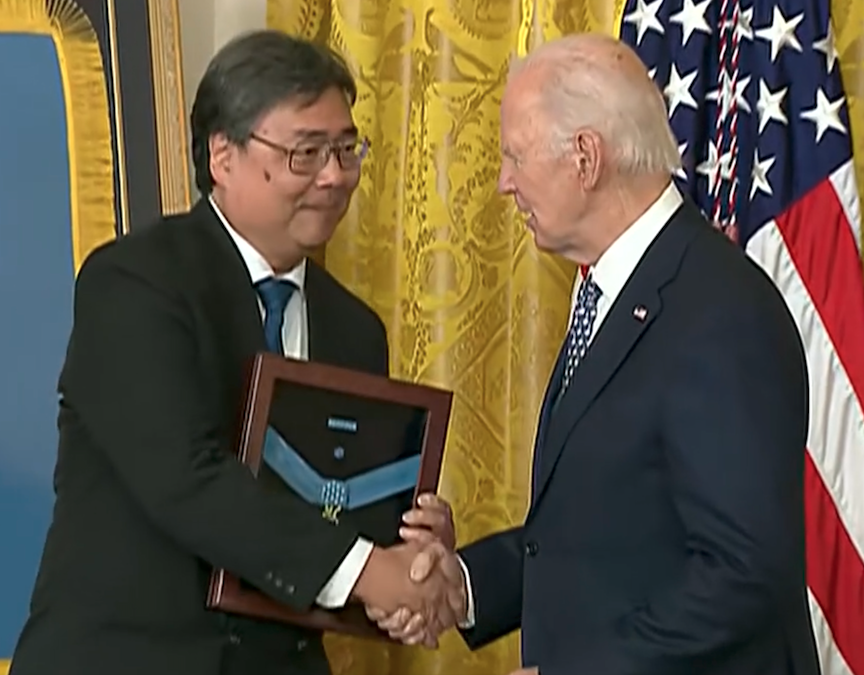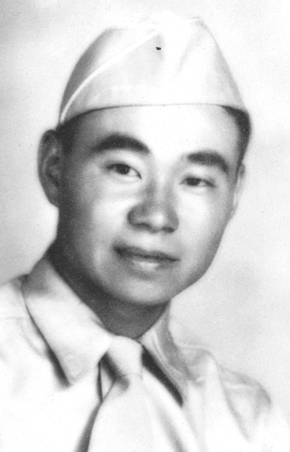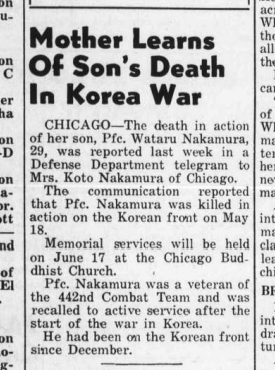
Gary Takashima shakes hands with President Biden on Jan. 3 after receiving the Medal of Honor awarded posthumously to his uncle, Wataru Nakashima.
Wataru Nakamura, veteran of WWII, Korean War, among the cohort.
By George Toshio Johnston, Senior Editor
With his term as the 46th president of the United States of America winding down, Joe Biden as commander-in-chief of the nation’s armed forces on Jan. 3 awarded seven Medals of Honor — the highest military decoration, awarded only to those who “distinguish themselves conspicuously by gallantry and intrepidity at the risk of their own lives” — to U.S. servicemen in a White House ceremony, all but one posthumously.

Pfc. Wataru Nakamura (Photo: Army)
Five of the medals were awarded to Korean War veterans: Gen. Richard E. Cavazos, Pfc. Charles R. Johnson, Cpl. Fred B. McGee, Pfc. Wataru Nakamura and Pvt. Bruno R. Orig. Cavazos was Mexican American; Hawaii-born Orig was Filipino American; Los Angeles-born Nakamura was Japanese American; and McGee and Johnson were African American.
According to the Military.com, the Medals of Honor awarded to Cavazos, Nakamura and Orig were made “… pursuant to laws providing for reviews to determine whether prejudice may have been involved in denying the Medal of Honor.”
Two of the medals were awarded to Vietnam War veterans: Capt. Hugh R. Nelson Jr. and Pfc. Kenneth J. David, who was the sole living recipient present.
“I’m deeply privileged to honor seven American heroes,” Biden said to those gathered. “Heroes of different ranks, different positions, and even different generations … who all went above and beyond the call of duty.”
Nakamura’s nephew, Glenn Takashima, attended the ceremony to receive the Medal of Honor — an upgrade from the Distinguished Service Cross — from Biden.
Prior to the Jan. 3 ceremony, the only other Japanese American to receive the Medal of Honor for service during the Korean War was Hiroshi “Hershey” Miyamura. (Pacific Citizen, Dec. 12, 2022, tinyurl.com/4rpztz69)
A member of I Co., 38th Infantry Regiment, 2nd Infantry Division, Nakamura was killed in action on May 18, 1951. He was 29.
Prior to America’s Dec. 8, 1941 declaration of war on Japan that marked its entry into World War II, Nakamura, the second of seven children, had lived and worked in San Francisco but would move to Arkansas to join his family, who were incarcerated at the Rohwer War Relocation Center after President Roosevelt signed Executive Order 9066 on Feb. 19, 1942.
With the war still being prosecuted, Nakamura joined the Army from Rohwer in April 1944, and was assigned to K Co. of the 442nd Regimental Combat Team, the famed, segregated Army unit comprised mostly of Japanese Americans from the Hawaii territory and the U.S. mainland. In 2000, when President Clinton belatedly awarded 22 Medals of Honor to WWII veterans of Asian heritage, 20 had served with the 442nd.
After the war’s end, Nakamura stayed in the Army Reserve, moved to Chicago and was called back to active duty after America entered the Korean War.

June 16, 1951 Pacific Citizen article reporting that Nakamura had been killed in action while serving in the Korean War.
According to the Army, Nakamura received the belated honor because he “ … singlehandedly attacked and destroyed a hostile machine-gun nest and drove the enemy from several of the bunkers they had captured. When his ammunition was depleted, he withdrew while under enemy fire.
“Nakamura then met an ammunition party ascending the hill. After briefing the officer in charge, Nakamura rearmed himself and, covered by the fire of the officer and two fellow soldiers, returned to the attack. He killed three of the enemy in one bunker and killed and seriously wounded another in the last enemy-held bunker. Continuing to press the attack, he fell mortally wounded by an enemy grenade.”



